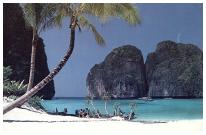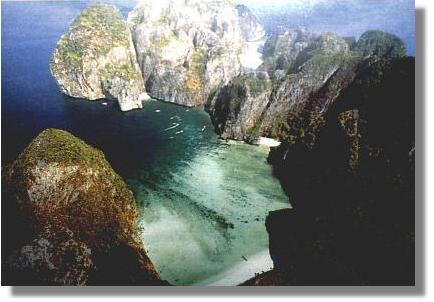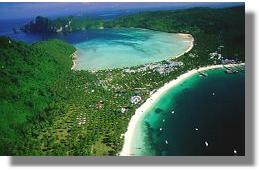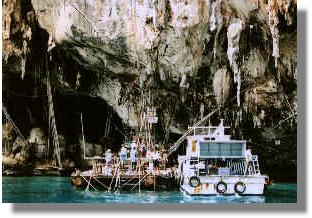

The Lagoon: "The lagoon itself was almost perfectly divided between land and sea. I estimated its diameter at a mile, though I wouldn't rely on the accuracy of this guess. Now nearer to the seaward cliffs than on the waterfall, I could make out features in the rock-face I hadn't seen before. Along the watermark were black hollows and caves. They looked as if they penetrated the cliff deeply - perhaps deeply enough to provide a passage for a small boat. the sea itself was punctuated by protruding boulders, slick where the waves lapped against them, flattened into slabs by centuries of tropical rain." page 102

"The cliffs are the reason we chose Phi Phi Le because in the story, the beach that the characters are living on is surrounded by the high sea cliffs from the sea. So, it's a secret. It's like a big secret, swimming pool and beach in private and this is the attraction for the characters. That's why we have to use Phi Phi Le." Andrew Macdonald, producer of "The Beach"
Phi Phi is situated in
Krabi Province in southern Thailand. The two islands  that
make up this group (Phi Phi Don and Phi Phi Le) are about 40
kilometres south-west of Krabi City. The islands are about equidistant
from Krabi and Phuket (to the north-west). The islands are famed
for their spectacular landscapes. Rock climbers are attracted
by the breathtaking cliffs, with tall sheer walls of limestone.
Nature lovers, meanwhile, find a haven in the islands' transparent
seas and corel beds, which are home to a wide range of sea life.
that
make up this group (Phi Phi Don and Phi Phi Le) are about 40
kilometres south-west of Krabi City. The islands are about equidistant
from Krabi and Phuket (to the north-west). The islands are famed
for their spectacular landscapes. Rock climbers are attracted
by the breathtaking cliffs, with tall sheer walls of limestone.
Nature lovers, meanwhile, find a haven in the islands' transparent
seas and corel beds, which are home to a wide range of sea life.
The two sections of Phi
Phi Don, the larger of the two islands, are linked by a 1 k.m.
isthmus of sand. Here stands the island's original Muslim fishing
village, Ban Ton Sai, now enveloped by an ever-expanding belt
of bungalows, cafes and hotels. A pleasant one-hour coastal walk
from Ban Ton Sai leads to Hat Yao
(long beach), with tantalising white sands, vibrant offshore
marine life and unhindered views to the soaring flanks of Phi
Phi Le, 4 kilometres away. It is also worth climbing the steep
trails on Phi Phi Don's two massifs, which afford wonderful vistas
over the island (see photo). Superb coral beds at Hin Pae off
Hat Yao provide some of the best snorkelling in Thailand. To
the north is Ban Laem Tong. This village's sea gypsy population
still survives on fish caught in the isolated coves of nearby
Laem Tong.
Ban Ton Sai leads to Hat Yao
(long beach), with tantalising white sands, vibrant offshore
marine life and unhindered views to the soaring flanks of Phi
Phi Le, 4 kilometres away. It is also worth climbing the steep
trails on Phi Phi Don's two massifs, which afford wonderful vistas
over the island (see photo). Superb coral beds at Hin Pae off
Hat Yao provide some of the best snorkelling in Thailand. To
the north is Ban Laem Tong. This village's sea gypsy population
still survives on fish caught in the isolated coves of nearby
Laem Tong.
In contrast to Phi Phi Don, Phi Phi Le remains uninhabited and unspoilt. Boats from Phi Phi Don bring visitors on day trips to see the paintings in Viking Cave (see picture). Another feature of the cave are the nests of edible swiftlet nests which are used in bird nest soup. Agile collectors climb rickety bamboo scaffolding to reach the nests, which are so valuable that the caves are protected by armed guards. In a bid to halt the illegal trade of the nests, staying overnight on the island is prohibited. There is excellent snorkelling at the coral reefs of ao Maya, a bay in the southwest corner of the island
![]() Movie Stills - Click here for stills from the movie which
shows scenes that were shot on Phi Phi Le island.
Movie Stills - Click here for stills from the movie which
shows scenes that were shot on Phi Phi Le island.
![]() Photo Album of Phi Phi - Many of these photographs were
taken by students and teachers at Sriwittayapaknam School. Others
were scanned from the local Thai papers and the international
press. People who wish to use these photographs please contact
the webmaster first in order to avoid copyright
problems. Please note that these links take you away from this
web site so they will open in a new window.
Photo Album of Phi Phi - Many of these photographs were
taken by students and teachers at Sriwittayapaknam School. Others
were scanned from the local Thai papers and the international
press. People who wish to use these photographs please contact
the webmaster first in order to avoid copyright
problems. Please note that these links take you away from this
web site so they will open in a new window.
- Maya Bay
- The secret lagoon which will be seen in the movie.
- Loh Samah Bay - This is the part of the island where the film crew landed every day.
- The Arrival - Pictures of the cast and crew arriving on location.
- The Boats - Modes of transport for going to the island
- The Interior - The Green Room and eating area on the island
- Making Paradise - How Maya Beach looked before the film-makers started work.
- Transformation 1 - Bulldozing the dune
- Transformation 2 - Planting the palm trees
- Hollwood's Paradise - The finished look
- Trips Magazine - This is a Thai tourist magazine which took photos around the island
- Phi Phi in March 1999 - Nearly two months after the film-makers have left
- Phi Phi in August 1999 - Five months later
- Phi Phi in October 1999 - Seven months later
- Loh Samah Bay - This is the part of the island where the film crew landed every day.
Glossary:
- Ao - bay
- Ko (pronounced gor with a short sound) - island
- Hat - beach
- Phi Phi (pronounced P.P.)
- Yao (pronounced yow) - long
- Ko (pronounced gor with a short sound) - island
Links:
- Moskito Diving 5 Star IDC - multilingual speaking Instructors and liveaboards.
- Phi Phi Island Travel Info - website for island with pictures
- Travel with Glenn to Phi Phi Island - dozens of pictures and useful travel info
- Phi Phi National Park
- Phi Phi Hotel
- Guide to Phi Phi Island
- Phi Phi Island Web Site
- Krabi and Phi Phi - accomodation and information
- Diethelm Travel's Phi Phi Islands
- Phi Phi Day Trip guide from thaiwave.com
- Barakuda diving - Phi Phi Islands (German)
- Photo Tour of Phuket and Phi Phi Islands
- Phi Phi Island information and pictures from phuket.com
- Stefan's Dive Report - Phi Phi Island
- Joakim's Dive Report - Phi Phi Island
- Calypso Diving
If you wish to add a link about Phi Phi Islands then please e-mail the webmaster.


Two excellent books about Thailand which we have used many times are Lonely Planet for Thailand by Joe Cummings (a visitor to this web site) and Eyewitness Travel Guide. You can order your copy today at amazon.com at a special discounted price by clicking on the book covers. Follow the link for reviews and prices. Click here for more books on Thailand.
